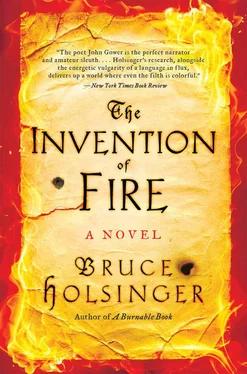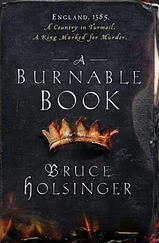Bruce Holsinger - The Invention of Fire
Здесь есть возможность читать онлайн «Bruce Holsinger - The Invention of Fire» — ознакомительный отрывок электронной книги совершенно бесплатно, а после прочтения отрывка купить полную версию. В некоторых случаях можно слушать аудио, скачать через торрент в формате fb2 и присутствует краткое содержание. Год выпуска: 2015, Издательство: HarperCollins, Жанр: Исторический детектив, на английском языке. Описание произведения, (предисловие) а так же отзывы посетителей доступны на портале библиотеки ЛибКат.
- Название:The Invention of Fire
- Автор:
- Издательство:HarperCollins
- Жанр:
- Год:2015
- ISBN:нет данных
- Рейтинг книги:3 / 5. Голосов: 1
-
Избранное:Добавить в избранное
- Отзывы:
-
Ваша оценка:
- 60
- 1
- 2
- 3
- 4
- 5
The Invention of Fire: краткое содержание, описание и аннотация
Предлагаем к чтению аннотацию, описание, краткое содержание или предисловие (зависит от того, что написал сам автор книги «The Invention of Fire»). Если вы не нашли необходимую информацию о книге — напишите в комментариях, мы постараемся отыскать её.
The Invention of Fire — читать онлайн ознакомительный отрывок
Ниже представлен текст книги, разбитый по страницам. Система сохранения места последней прочитанной страницы, позволяет с удобством читать онлайн бесплатно книгу «The Invention of Fire», без необходимости каждый раз заново искать на чём Вы остановились. Поставьте закладку, и сможете в любой момент перейти на страницу, на которой закончили чтение.
Интервал:
Закладка:
“Yes, my lord?” said the guard, head high.
“Take Master Gower here down into the yard and have Usk ready one or two of the small guns for him.”
“The handgonnes, sire?”
“Yes, from that store in the west keep.”
“Aye, sire.”
Beauchamp nodded a curt farewell and spun on his heel, heading back to the captain’s quarters. The guard led me down to the yard, where he spoke to a man named Usk, who looked me over with that soldier’s tired disdain for the noncombatant. After ordering out a few of the small guns, he took me to a corner of the castle yard in which a large quantity of wood had been piled to nearly my height: splintered boards, broken beams, the remnants of a shack. I would be shooting into the pile, he told me, and the boards would prevent the shot from caroming off the stone walls. Nearby a cook and his boy had set a meal for the soldiers on a log-and-board table, a fire crackling and smoking behind them.
Another soldier arrived with the guns. He had four of them, simple-looking devices consisting of tubes of bronze bolted to wooden helves, each weapon no more than four feet in length. Along the barrels were fastened several metal rings, giving the guns a ridged appearance. We each took one in hand.
“First pour a quantity of powder down the barrel, just so.” He demonstrated on his weapon, taking a pre-measured flask of grained powder and tipping it into the barrel. I followed his example on my own handgonne.
“Now the patch and pellets. We use these.” He handed me a small wad of parchment that cupped a handful of pebbles mixed with metal shavings.
“Not a single ball?”
“Not in these guns.” He shook his head grimly. “Tried it on the first of them, but the thing exploded in our man’s hands and took two fingers clean off. Smaller shot means less pressure, the smiths tell us. So. Smaller shot.”
He twisted the parchment over the pellets and placed the wad on the end of the barrel. Then, using the rounded end of a rod-a drivel, he called it-he rammed the wad home so that it was lodged between the powder and the mouth of the barrel. I copied his movements.
Once the gun was loaded I examined the barrel, which appeared to be fashioned of iron staves.
“Hammer-forged and welded, not cast,” he said, tracing a finger along the barrel of his weapon. “The seams are beveled and welded, and the whole kept together with these rings along the barrel.”
“I see.”
“Firing pan is here, touchhole here.” His finger brushed a round indentation near the stock. In the middle of it was a small hole drilled into the barrel. “That’s where your powder sits when you ignite, and the spark passes through the touchhole. Wait a moment.”
He walked over to the cook’s hearth and took a coal from the fire, returning with a glowing stick. He handed it to me and prepared himself to fire at the pile.
“When I give you the nod, you lower this into the pan. Very simple, just a quick touch, then move your hand away, see?”
As I watched he raised the gun to his armpit, pointed the mouth of the barrel slightly upward, and nodded. I lowered the glowing stick into the pan, heard a brief fizzle, then-
Crack .
A stunningly loud report as the powder ignited and the gun fired, singeing the hairs near my knuckle.
Usk laughed as I shook out my hand in the air. “Your turn.”
He helped me position the gun beneath my arm. “Now point the barrel toward the target, just . . . there.”
I did as he told me.
“Keep the stock snug, as if you’re couching a lance, though not too tight.”
I had never held a couched lance, though I knew what he meant. I positioned the end of the helve between my arm and chest, applying as much pressure as I thought would keep the gun in place.
“One final instruction. You will want to close your eyes at the moment I touch the coal to the powder, or you may end up blinded. We have had men lose both eyes at once firing these guns.”
How rich that would be, I thought, to be blinded by a handgonne rather than waiting for Lady Nature to take her course with my eyes. I briefly considered putting on my spectacles for protection, though I wanted to see the effects of the shot and the impact of the pellets.
“Are you ready?”
I nodded. Usk blew on the stick, creating an inch of orange, then brought the glowing coal toward the pan. I tensed, squeezed the stock beneath my arm, and readied for the touch.
Crack.
An ear-splitting report. The gun erupted in my arms, the acrid smell of burned powder rising to my nose. I had blinked, of course, and seen only a split moment of the flash, though the stock had remained steady beneath my arm. Before me a curl of smoke ascended from the woodpile. With my skull ringing like a belfry I handed the gun to Usk and approached the pile.
In the middle of a large sawed beam I found the peppered holes created by the projectiles hurled from my weapon. The wood still smoldered along the edges, the handgonne having wrought considerable destruction for such a small weapon.
I asked to fire again. He handed me a slightly different weapon this time, with a longer barrel but no stock. This one I was told to put over my shoulder. It used more powder and fired a larger scatter of stones. After I loaded and tamped he fastened a rag about my head.
“To save your ears,” he said wryly as he knotted it in back.
The concussive force of the second gun nearly knocked me to the ground, though I managed to stay on my feet while the smoke wafted and cleared. A board at the front of the pile had shattered with the impact, throwing splinters of wood in every direction. I thought of a shield, and what such a weapon would do to the unarmored body of a man.
Beauchamp was correct in part. These handgonnes were awkward and inelegant weapons. The assistance of another man was required to ignite the powder, and they seemed quite perilous to those firing them. Attempts to hit a target from beyond forty or fifty feet would be futile, rendering the guns largely useless for precision combat from any great distance.
Yet what struck me most forcefully was how simple the weapons were relative to the terror and awe they inspired. No real skill, no dexterity, no sense of aim was necessary for their use, merely the correct sequence of powder, shot, and flame. I knew from youthful experience how difficult it could be to launch an arrow effectively from a bow, how many months were required to hone such skills before an archer could hope to shoot with any accuracy or speed. With these handgonnes, by contrast, a man needed only the small measure of strength necessary to lift the barrel or stock to the armpit or shoulder, and with it a soldier of no skill or brawn would become instantly capable of killing a man, woman, or child.
The garrison’s guns had thrilled me with their terrible potency, their muscular allure. I was both smitten and repulsed, seduced by the simple power of the guns yet troubled by the new modes of violence they threatened. I thought of Prometheus, stealing the first flaming brand from the gods and bringing it triumphantly to man. The invention of fire gave us warmth, even as it cursed us with myriad new ways to suffer and die.
Chapter 30
The roads were crowded that afternoon with groups of merchants and many others making their way south from York, the last large town before the Palatinate of Durham. The pilgrims were still two leagues from Doncaster, where, they were told by a passing trio of riders, they would find lodgings scarce indeed for their large company. At the advice of a local carter they decided to push several miles on to Aldwick le Street, a market town where the carter’s brother worked for a keeper. Upon arrival in the village they found a commodious inn with a comfortable barn, a wide hall, even private rooms for the gentles.
Читать дальшеИнтервал:
Закладка:
Похожие книги на «The Invention of Fire»
Представляем Вашему вниманию похожие книги на «The Invention of Fire» списком для выбора. Мы отобрали схожую по названию и смыслу литературу в надежде предоставить читателям больше вариантов отыскать новые, интересные, ещё непрочитанные произведения.
Обсуждение, отзывы о книге «The Invention of Fire» и просто собственные мнения читателей. Оставьте ваши комментарии, напишите, что Вы думаете о произведении, его смысле или главных героях. Укажите что конкретно понравилось, а что нет, и почему Вы так считаете.












